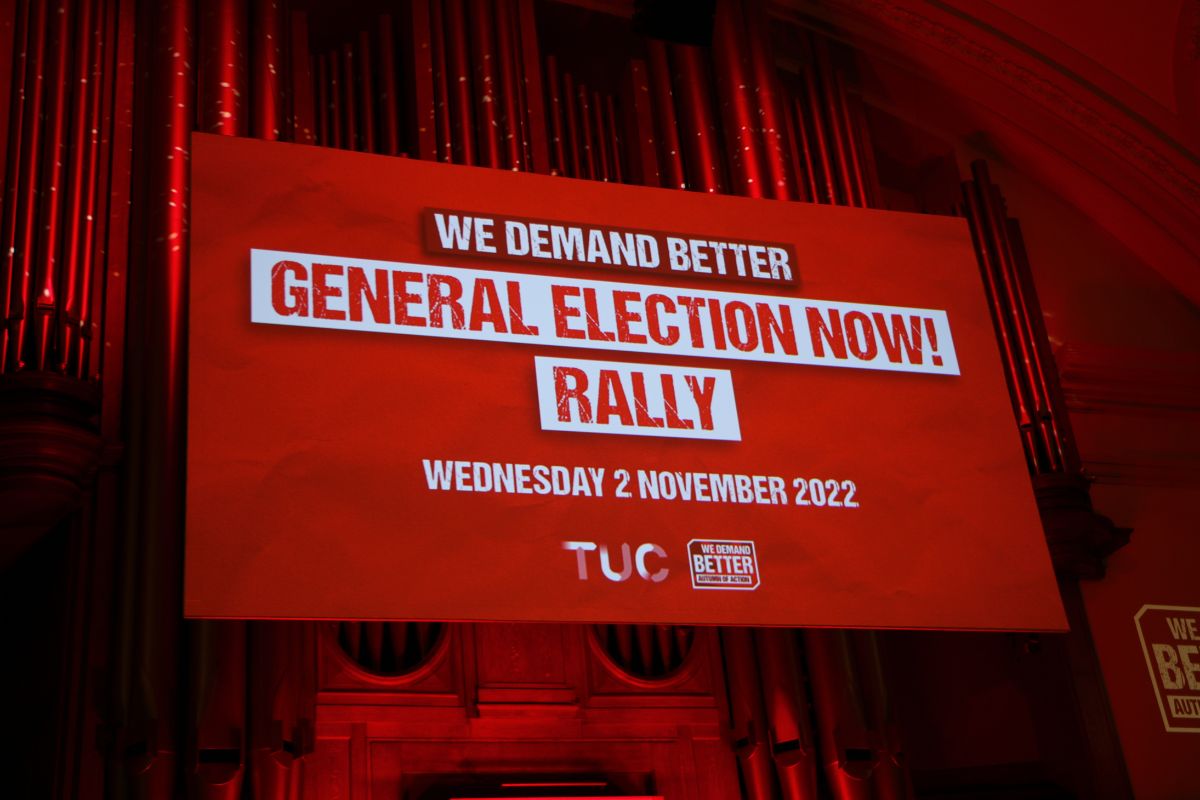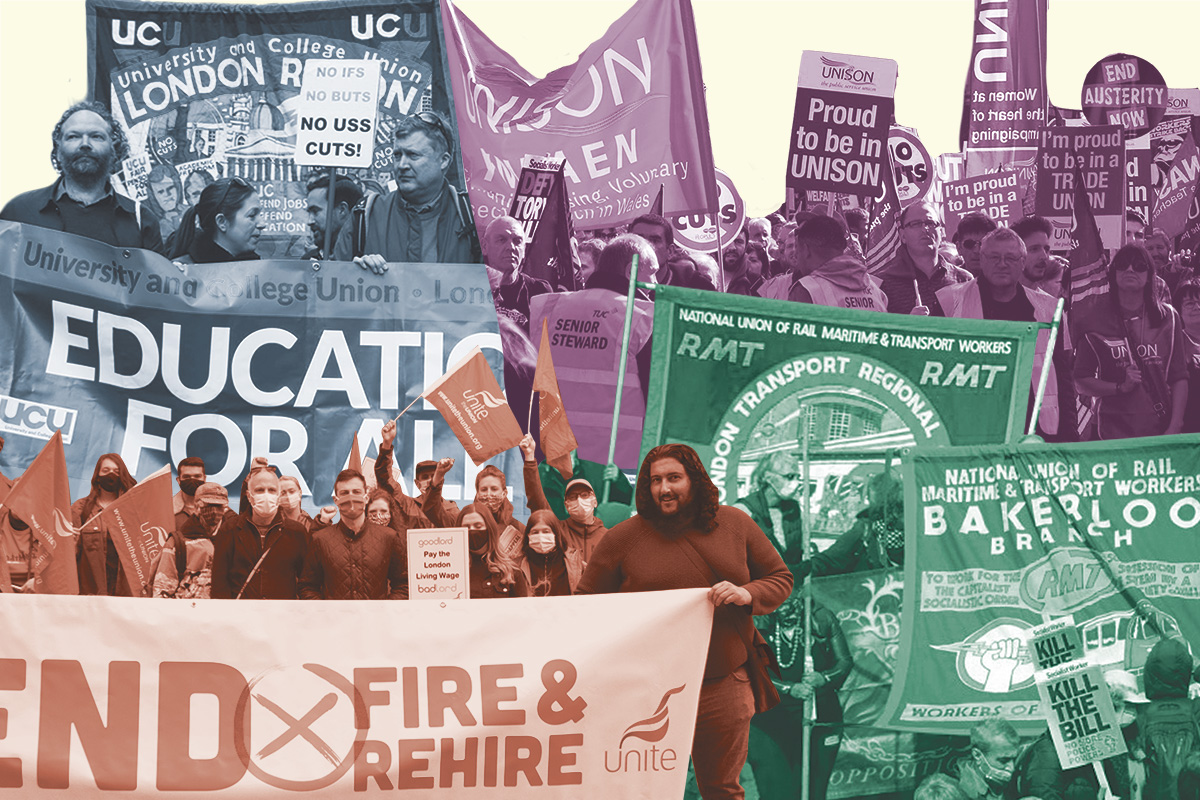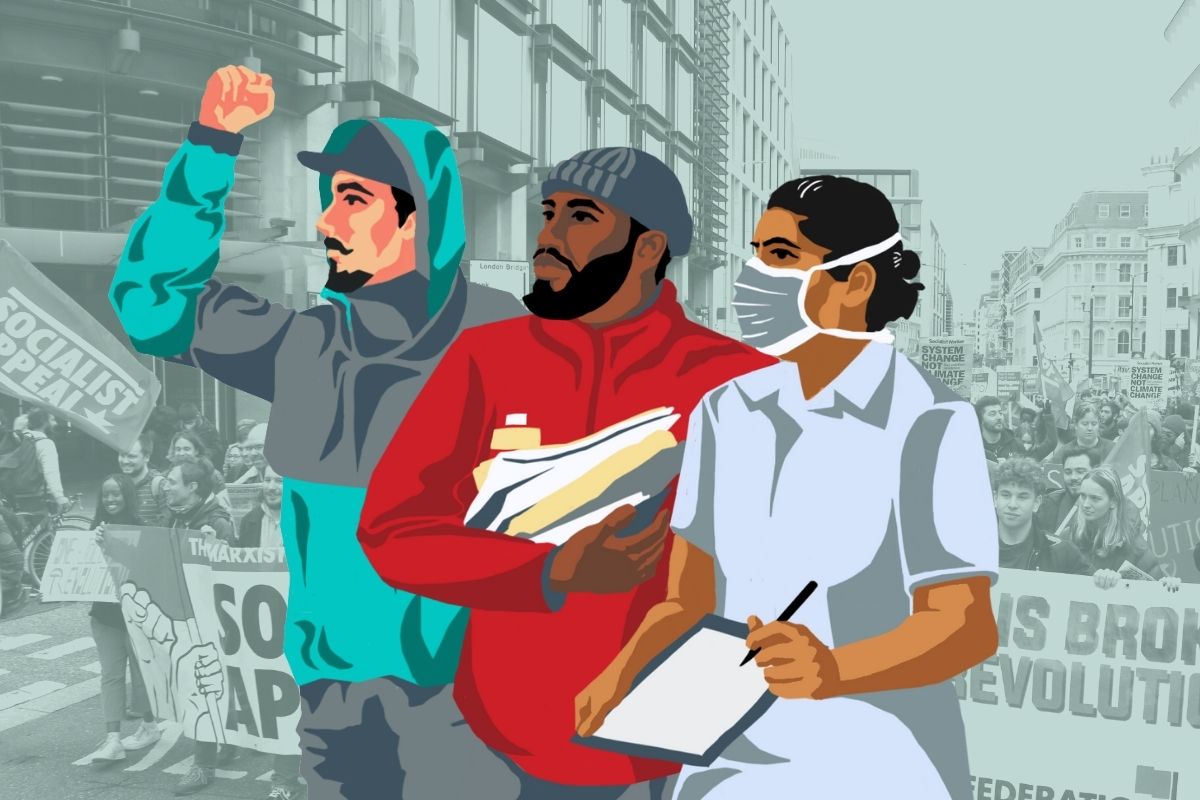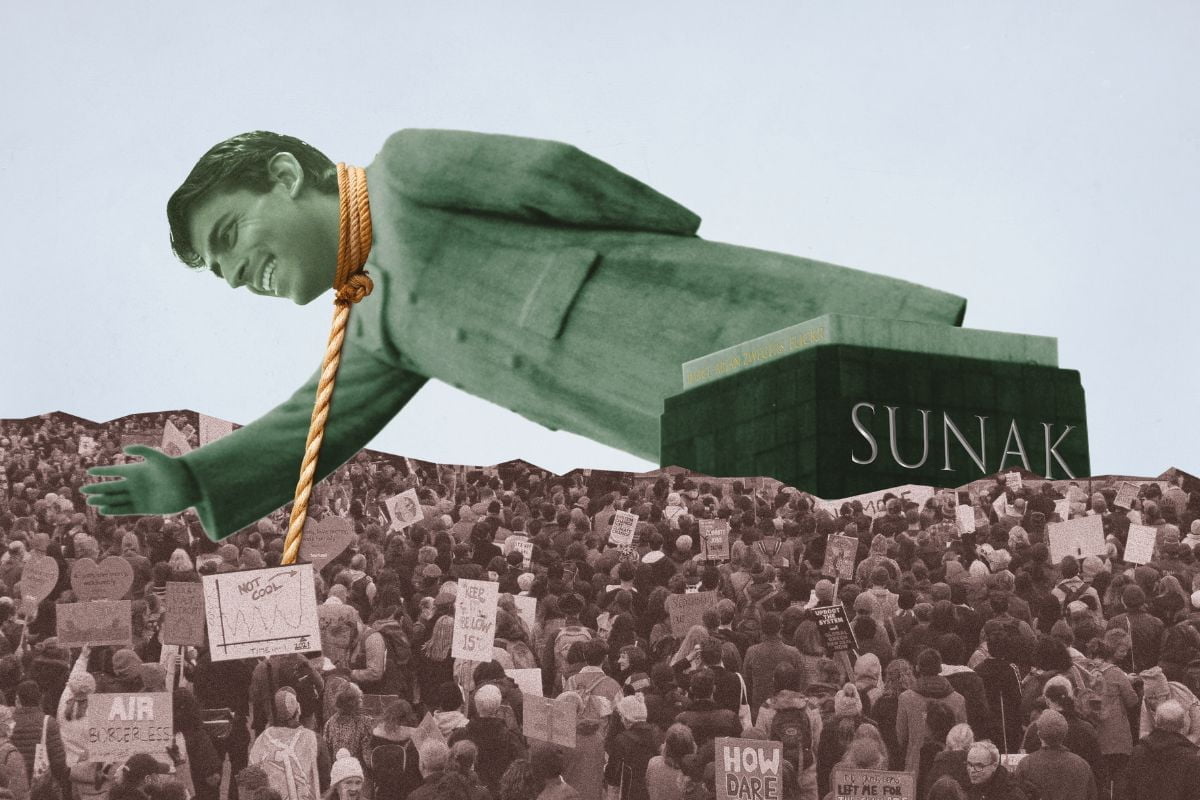The Tories have crowned a new prime minister. But the government continues to be thrown from pillar to post, and stumble from one crisis to the next.
Support for the Conservative Party has plummeted. Top pollster Sir John Curtice has even suggested that the Tories are heading for a 1997 style wipeout at the next election. And recent weeks have seen the ruling party fall 30 points behind Labour.
These Etonian enemies of the working class will not go down without a fight, however. Indeed, they are sharpening their knives for a new round of cuts and austerity.
No wonder then that workers and youth are desperate to kick this bankers’ government out of power.
The TUC rally held at Westminster Central Hall this week, on Wednesday 2 November, and the People’s Assembly demo taking place in London tomorrow, Saturday 5 November, are therefore well-timed.
Remember. Remember. 5th of November – Support and retweet@pplsassembly National Demo: GENERAL ELECTION NOW – STRIKE – PROTEST – RESIST
JOIN @RMTunion @unitetheunion @pcs_union @fbunational @Dis_PPL_Protest and more from 12.00 noon, Sat 5 Nov, Embankment, London pic.twitter.com/D0Q9CssUXY
— Alex Gordon #JoinAUnion (@alexgordon4me) November 4, 2022
There is no time to lose. The situation is reaching breaking point for workers, the poor, and the most vulnerable.
The trade union movement must therefore deal the finishing blow – and kick out the Tories and their big business chums for good.
Rally

Wednesday’s TUC rally, despite being held in the evening, had hundreds in attendance. Speakers included trade union general secretaries such as Mark Serwotka (PCS), Mick Lynch (RMT), Mary Bousted (NEU), Gary Smith (GMB), and Jo Grady (UCU).
Rank-and-file union activists also spoke, giving a flavour of the mood in their workplaces. For example, one rep mentioned how previously less active union members are now approaching them asking when they are going to strike.
What was also notable was that almost every speaker was from a union that is either balloting nationally, or is already set to strike nationally: from the UCU and Fire Brigades Union, to the GMB and the National Education Union. Even the Royal College of Midwives is balloting its members in England and Wales.
The tone was one of optimism, with a recognition that the unions are now at the forefront of the struggle.
The ruling class recognises this fact too. And given the threats to attack the labour movement coming from Sunak’s government, there were also fighting words in response.
“If governments pass laws to effectively ban strike action they must be met with resistance.” Unite speaker Oney Kasab stated.
“Never mind ‘see you in court’, it’s see you on the picket line!” Kasab bellowed, consciously criticising the TUC’s proposals to fight anti-union repression through legalistic means.
All of the speakers also emphasised the power that the organised working class holds. Furthermore, those on the platform emphasised that it is incumbent on the trade unions not only to be the first line of defence for workers in times of deep capitalist crisis, but to also go on the offensive.
“Our emancipation is in our hands! Our emancipation is in our organisation!” Lynch declared to large cheers, “so let’s commit ourselves to struggle!”
“Are you on the side of the workers? That is how history is going to judge you. Where were you during this wave of disputes”
Mick Lynch of the @RMTunion at the @The_TUC rally tonight with some questions for our politicians. pic.twitter.com/o13VtB2VSx
— Saul Staniforth (@SaulStaniforth) November 2, 2022
Austerity
And a bitter struggle will be necessary. With the bankers’ champion, Rishi Sunak, now at the helm, and Britain entering what could be its longest ever recession, according to the Bank of England, a further assault on workers’ living standards is looming – and fast.
The exact details will be announced on 17 November. But already, Treasury officials are talking about a £50 billion black hole in the government’s budget. And there is no doubt as to how this will be filled: through yet another wave of brutal austerity.

As part of this, public services, already cut to the bone, will be starved of further resources. As PCS general secretary Mark Serwotka commented at the TUC rally, 45,000 PCS members have already reported having to claim benefits while in work.
This is all while the bosses and bankers report huge profits. Recently, BP was the latest fossil fuel giant to announce record profits. The oil and gas monopoly raked in £7.1 billion between July and September.
Workers and youth cannot suffer any longer. The time to act is now. And it is incumbent on the trade unions to do so.
Labour
Speakers at the TUC rally also recognised the obvious: with the Tories set to lose the next general election, whenever this is, it will be a Labour government that gets in.
This would not represent any genuine support for ‘Sir’ Keir Starmer and his right-wing Labour Party. Rather, it would be more of an expression of the dire need to turf the Tories out.
Although the union is unaffiliated to the party, UCU general secretary Jo Grady commented on the prospect of a Labour government.

“To the Labour Party, I have a serious message,” Grady said. “You have a unique opportunity to join the trade unions and rebuild this country.”
“But that will not happen if you play the Tories at their own game. It will not happen if you pursue austerity 2.0 under the guise of tough decisions.”
The track record of Starmer’s Blairite leadership has been clear so far, however: cosying up to the establishment while turning its back on workers in struggle.
What’s more, a Starmer Labour government would be faced with the same crisis-ridden capitalist system and the same mountain of debt.
At the end of the day, austerity measures aren’t a political choice: it’s what capitalism demands to make the working class pay for its crises.
And if recent weeks have demonstrated anything, it’s that it is the financiers, big business, and the market that dictates to the government, not vice versa. This would be just as true for a Starmer administration as for Truss or Sunak – even more so, in fact.
A Starmer government would therefore similarly be a government of instability and chaos; one incapable of seriously improving conditions for the working class.
In fact, Starmer has declared that a future Labour government, like Sunak’s Tories, would be “fiscally responsible”, and that Labour is the party of “sound money”.
These are direct promises by the Labour leader to the capitalists: you can trust me to act in your interests and carry out austerity!
Clearly the whole movement would welcome the end of Tory rule. But Starmer’s reassurances to the establishment must also serve as a warning to the working class.
The trade union leaders must therefore prepare rank-and-file activists for a fight against a future Starmer Labour government also – and ensure that workers are not demobilised once the Tories are pushed out.
Instead, the organised working class must keep their weapons on them, and be ready to turn them against ‘Sir’ Starmer and the Labour right wing.
Strategy

But for now, the big question is: how do we actually give the Tories the boot?
The answer to this was expressed very well by Mick Lynch at the recent TUC Congress, where he called for a mass mobilisation of the whole working class. “We need an uprising!” the RMT leader boldly asserted.
Indeed, the TUC now has a mandate to coordinate industrial action between the unions, in combination with demonstrations and rallies across the country.
The union leaders must now translate these words into deeds. Rolling strike action, coordinated between the trade unions, from education to transport to the civil service, would bring the government to its knees.
Such a militant strategy – combined with workers and youth hitting the streets en masse, as part of a mass campaign of demonstrations, rallies, and industrial action – would force Sunak to put the same question to the country that Tory PM Ted Heath did in 1974: ‘Who really runs the country?’ And the answer then, as it would be now, was: ‘Not you!’
Socialism

Tomorrow’s demo should therefore be a launchpad for a wave of mass strikes and action on the streets, designed to sweep out this bankers’ government.
This weekend’s protest is likely to see thousands on the streets of London. Activists from across Britain are mobilising – not only for an end to Tory rule, but also for the nationalisation of energy, water, mail and rail; the scrapping of anti-union laws; and for inflation-busting pay rises.
This is a welcome start. But as long as the main levers of the economy sit in the hands of the bankers, bosses, and billionaires, then the chaos and crises of capitalism will remain.
The movement must therefore be unafraid of demanding what is needed to truly solve the dire problems facing ordinary workers. This means nothing less than the nationalisation of the big banks and top 100 monopolies, as part of a socialist plan under workers’ control.
Kicking out the Tories is just the first step. Ultimately, whoever occupies 10 Downing Street, whether this be a knight of the realm or a banker from the City, we must fight to kick out the whole rotten capitalist system.






